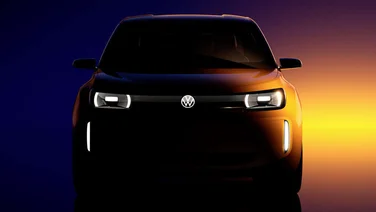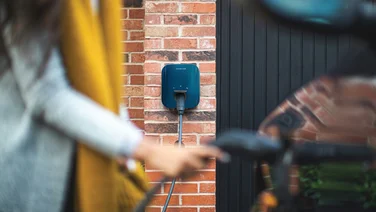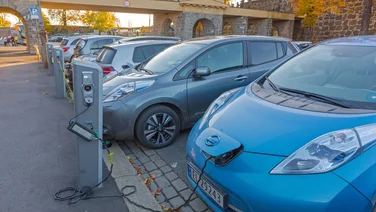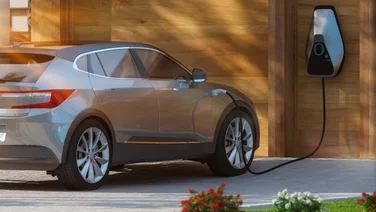- What is a self-charging electric vehicle?
- Are self-charging cars worth it?
- What's the difference between a self-charging hybrid and a plug-in hybrid?
- How much do self-charging electric vehicles cost?
- Pros and cons of self-charging electric vehicles
- How popular are self-charging electric vehicles?
- The best self-charging vehicle on the market
- Next steps
✔ There are only a handful of manufacturers creating self-charge electric vehicles
✔ The Kia Niro is the best self-charging vehicle on the market right now
✔ Self-charging cars are cheaper than regular plug-in hybrids
Self-charging vehicles sound great, but do they do what they say on the tin? EV charging point costs a lot already, so avoiding buying one with a self-charging car would be great.
Unfortunately, self-charging vehicles do still need to be charged. We’ll explain why, explain how they differ from other electric cars, and let you know if we think they’re worth it.
To get a free quote for a charging point, simply fill in this form.
Get free EV charging point quotes
Answer a few quick questions, and our trusted installers will send you bespoke EV charging point quotes – for free.
What is a self-charging electric vehicle?
A self-charging vehicle is a hybrid vehicle that uses the kinetic energy generated when braking (called ‘brake regeneration’ or ‘regenerative braking’) to charge a small rechargeable battery, which is then used to assist the vehicle in acceleration.
Like other hybrid cars, a self-charging vehicle still uses either a diesel or petrol engine, which does the bulk of the engine work.
What a self-charging vehicle is not, is a vehicle capable of driving indefinitely on its own power alone.
This fact has generated some negative press surrounding so-called self-charging vehicles, with some calling it a misnomer.
Are self-charging cars worth it?
Self-charging cars are worth it if you’re looking for a bridge from petrol or diesel cars to electric cars, but that’s about it.
The self-charging moniker is about as misleading as they come. Many people think these cars can charge themselves endlessly on the go, but this isn’t true.
Not only does this suggestion ignore the laws of physics, it’s also a manipulative form of marketing. The idea that electric vehicles can actually charge themselves and then drive a good distance on said charge is, unfortunately, false.
Self-charging vehicles as they are right now are only capable of charging a battery enough to travel a short distance.
This is because the batteries used in self-charging vehicles are much smaller than those used in fully electric vehicles, or PHEVs (plug-in hybrid electric vehicles).
The battery is smaller for many different reasons, but the main reason is that a larger battery would never reach a full charge from the energy generated by braking alone. There just isn’t any point in putting a large battery in a self-charging vehicle.
As we see it, a self-charging vehicle is little more than car manufacturers jumping on the eco bandwagon. When the bulk of the car is still powered by fossil fuels, the addition of a tiny battery and a self-charging tag is tantamount to ‘greenwashing’.
You’ll still be spending a substantial amount on petrol or diesel to keep your self-charging vehicle running.
The other thing is that in order to generate enough energy from ‘regenerative braking’, a self-charging vehicle needs to rely on its petrol or diesel-powered engine to get to a suitable speed in the first place.
So a self-charging vehicle is just an ordinary car with a tiny battery that picks up the slack from time to time.

What’s the difference between a self-charging hybrid and a plug-in hybrid?
A self-charging hybrid runs on fuel and isn’t capable of being charged with electricity to run, because the battery isn’t designed for this.
Plug-in hybrids have batteries that can be charged with an EV charger, but still use fuel to pick up the slack when the battery doesn’t have enough charge.
How much do self-charging electric vehicles cost?
The number of self-charging vehicles on the market is small, with only a handful of manufacturers producing any (at the time of writing, these are Toyota, its division Lexus, and Kia).
And because self-charging vehicles don’t reduce CO2 emissions to anywhere near the same degree as PHEVs, you won’t receive the same tax benefits for them.
The average cost is usually less than a plug-in electric car. You’re effectively buying a standard petrol/diesel car with a small battery to help with acceleration, and paying similar prices.
For example, a brand-new self-charging Kia Niro is available to purchase from £28,460. The PHEV Niro comes in at £33,300 – not a massive difference, but enough to give you pause for thought.
What might change a few minds about the extra cost of a PHEV is the fact that a self-charging car will use more fuel. Even with the electric battery, your fuel costs will remain similar to an ordinary car with a combustion engine.
Over time then, a PHEV would save you a substantial amount in fuel and tax costs. The benefits are even better for a fully electric car, with British drivers able to save around £1,000 per year (and just over £5,000 after five years).
Although cost is often a barrier to electric vehicles, our National Home Energy Survey found that only 55% of people would have an EV if it were free.
Pros and cons of self-charging electric vehicles
While it may appear that we’ve been overly harsh on self-charging electric vehicles, they do still have a few meaningful benefits. Here’s a table showing the pros and cons of self-charging vehicles:
- Cheaper than a plug-in hybrid car
- Reduces overall fuel consumption
- A stopgap on the road to a try hybrid or purely electric vehicle
- Lower emissions
- No need to plug into a charging point
- Still uses fossil fuels…
- …so you'll still be spending money on fuel
- Can only travel a very short distance on electric power
- Misleading name
- Energy needed to charge battery comes from fossil fuels
- Not as fuel-economic as normal hybrids
How popular are self-charging electric vehicles?
In the first half of 2021, electric vehicles made up an encouraging 26% of total new car sales in the global automotive market. How much of these were self-charging is unfortunately difficult to find, but it’s clear that electric vehicles are increasing in popularity every year.
The Toyota Prius, itself a pioneer in the self-charging vehicles market, reached a milestone of 15 million sales in 2020.
So the concept of self-charging cars is certainly not a new one, but the term has only been used in marketing since 2019.
In October 2021 in the UK, 16% of all new car sales were hybrid. And in September 2021, the UK’s electric car sales as a whole (including pure-electric vehicles) increased by 50% over the same period in 2020.
What’s exciting is that the number of electric car registrations in September 2021 alone (32,721), both hybrid and fully electric, nearly exceeded the entirety of the UK’s electric car sales in 2019 (37,850).
It’s clear that electric vehicles are increasing in popularity as more and more people recognise the need to shift away from fossil fuels.
Another important factor to consider is the ongoing fuel crisis, with incidents like the recent petrol shortage spurring people to think about buying an electric vehicle.
The Eco Experts’ National Home Energy Survey made the increasing popularity of EVs even more apparent. According to the survey, 69% of UK residents said they would buy an EV if money wasn’t an object.
A further 17% said they intend to buy an EV in the next 12 months — we can only expect this number to increase as electric vehicles become more popular.

The best self-charging vehicle on the market
Though the choices are slim, we’d say that the Kia Niro represents the best self-charging vehicle on the market right now.
At a cost of £28,460 (according to the Kia website), its build quality is amongst the highest of other electric vehicles in this price bracket.
Additionally, its spacious 427-litre boot makes the Kia Niro ideal for families – it has more than enough room for suitcases, buggies, a large dog, etc.
Fuel economy is generally excellent too, with the vehicle capable of doing around 205 miles to the gallon.
As for ease of driving, the Niro’s dual-clutch automatic gearbox makes it incredibly smooth to drive. Sure, it won’t zip around with much agility and its acceleration can leave a lot to be desired, but most potential buyers won’t be too concerned with these faults since it’s a family oriented car.
Next steps
We might have spent much of this article talking about how self-charging vehicles really don’t do enough to help reduce the planet’s carbon emissions.
However, any move towards more environmentally friendly transportation is still a good one.
For many people on the fence about electric vehicles, a self-charging hybrid represents a convenient step on the route to going fully electric. When people do make the jump to either fully electric or a PHEV, it’s always a good idea to think about getting a charging point installed.
This is because just plugging in an electric car to a domestic power supply means it’ll take a lot longer to charge.
If you’d like to find out how much a charging point might cost you, simply fill in this form and get a free quote today.






